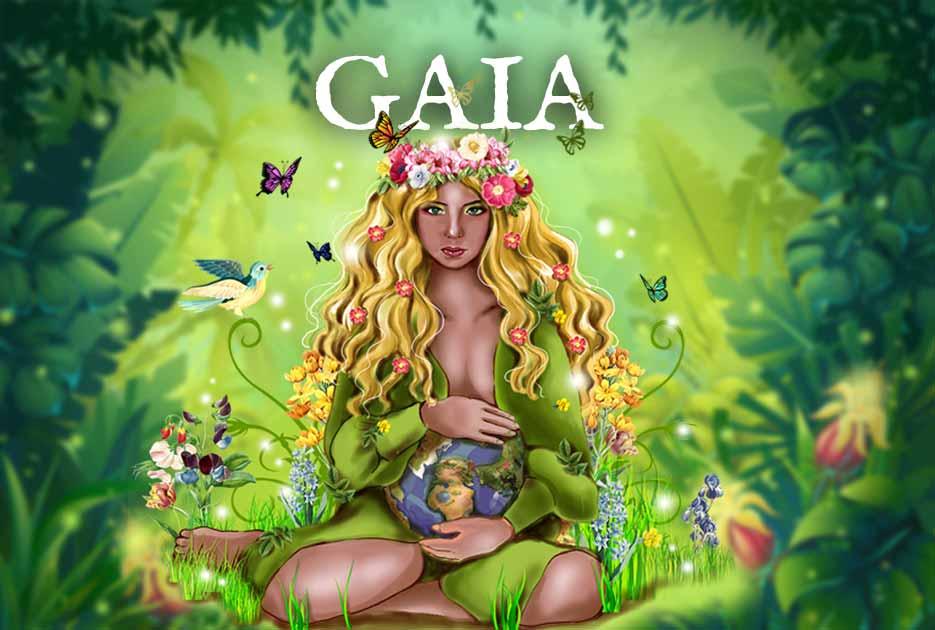Table of Contents
- Exploring the Origins of the Gaia Name and Its Cultural Significance
- Understanding the Spiritual Connotations of Gaia in Various Traditions
- How to Embrace the Gaia Philosophy in Everyday Life
- The Relevance of Gaia in Modern Environmental Movements
- Choosing the Perfect Gaia-Inspired Name for Your Child or Project
- Q&A
- Future Outlook

Exploring the Origins of the Gaia Name and Its Cultural Significance
The name “Gaia” has deep roots in ancient history, stemming from Greek mythology where it is commonly associated with the Earth itself. Gaia, known as the personification of the Earth, represented a nurturing and life-giving force. In the mythological tapestry, she is celebrated as the mother of all, birthing the sky, mountains, and seas. This connection to the Earth resonates throughout various cultures, emphasizing notions of fertility, nourishment, and stability. As humanity grew more aware of environmental issues, the name has regained popularity, representing a harmonious balance with nature.
Beyond its mythological origins, the Gaia name has permeated modern culture and science. With the Gaia hypothesis proposed by James Lovelock in the 1970s, the concept evolved into an ecological awareness, viewing the Earth as a complex, interdependent system. This scientific perspective views all living organisms as integral to sustaining life, echoing Gaia’s ancient symbol of unity. The name has also inspired artistic endeavors, resonating in literature, music, and visual arts as a representation of beauty and interconnectedness. Notably, Gaia’s inclusive essence embodies the idea that all living beings share a profound relationship, reinforcing the importance of global stewardship.
The cultural significance of the name transcends geographical boundaries. In different languages and traditions, variations of Gaia appear, often symbolizing the Earth or the feminine spirit within nature. For instance, in Roman mythology, Gaia is equated with Tellus, emphasizing agriculture and the fertility of land. Creatively, many contemporary wellness movements adopt the name to invoke feelings of peace and balance, often encouraging practices that align with environmental sustainability. This rich tapestry showcases how a single name can embody various themes, making it not just a personal identifier but also a symbol of collective consciousness and respect for our planet.

Understanding the Spiritual Connotations of Gaia in Various Traditions
The concept of Gaia serves as a profound symbol across various spiritual traditions, representing the Earth as a living entity imbued with divine energy. In ancient Greek mythology, Gaia is not just the personification of Earth, but also the mother of all life. Her essence embodies fertility and nurturing, emphasizing a connection between humanity and the natural world. This understanding of Gaia encourages reverence for nature, underscoring the belief that the earth is a sacred being deserving of respect and care.
In contrast, many Indigenous cultures view Gaia through the lens of interdependence and reciprocity. Here, she is often perceived as a grandmother figure, providing sustenance and protection. These traditions highlight the importance of maintaining harmony with the Earth and acknowledge that every action has consequences. The teachings often stress simple principles that guide interactions with the environment, such as:
- Respect for Nature: Viewing all elements of the Earth as interconnected.
- Responsibility: Understanding that humans are stewards of the planet.
- Gratitude: Regularly expressing thanks for the gifts nature provides.
Moreover, in Eastern philosophies, particularly within some interpretations of Buddhism and Hinduism, Gaia symbolizes the material world as a manifestation of the divine. The Earth is seen as a teacher, offering lessons on impermanence and interconnectedness. Practices like meditation and mindfulness encourage a deep awareness of nature, urging individuals to recognize their role within the vast tapestry of existence. These spiritual paths advocate viewing Gaia not merely as a background to human life, but as a vibrant presence that invites engagement and introspection.
How to Embrace the Gaia Philosophy in Everyday Life
Embracing the Gaia philosophy starts with cultivating a deep awareness of our interconnectedness with nature. This requires a shift in mindset, where the simple act of stepping outside becomes a way to connect with the Earth. Consider engaging in outdoor activities that foster appreciation for the environment, such as:
- Nature Walks: Take a leisurely stroll in a nearby park or forest, allowing yourself to observe the flora and fauna.
- Gardening: Start a small garden, whether indoors or outside, to connect with the cycles of growth and decay.
- Mindful Moments: Set aside time each day to meditate outdoors, focusing on the sounds and smells of nature.
Another aspect of this philosophy is incorporating sustainable practices into your daily routine. Making conscious choices about consumption and waste can greatly reduce your ecological footprint while honoring the planet. Here are some actionable steps:
- Reduce, Reuse, Recycle: Prioritize using items more than once and recycle whenever possible.
- Support Local: Purchase from local farmers’ markets or businesses to minimize transportation emissions.
- Eco-Friendly Products: Opt for biodegradable and eco-friendly cleaning and personal care products.
fostering a community around these principles enhances the impact of embracing the Gaia philosophy. Building connections with like-minded individuals can offer support and inspiration. Consider hosting or participating in:
- Workshops: Organize events focused on sustainability or ecological education.
- Conservation Days: Join or volunteer with local organizations dedicated to conservation efforts.
- Book Clubs: Create a group centered around literature that explores ecological themes.

The Relevance of Gaia in Modern Environmental Movements
The concept of Gaia, which proposes that Earth and its biological systems behave as a single, self-regulating entity, has found renewed significance within contemporary environmental movements. This holistic perspective resonates deeply with advocates who view ecological sustainability not just as a collection of isolated actions but as an interconnected web of relationships. By promoting a vision where human activity is seen as part of a broader ecological narrative, Gaia encourages a shift in mindset, inspiring individuals to see their role in the preservation of the planet.
Many modern organizations and grassroots efforts leverage the Gaia hypothesis to galvanize public support and inspire action. Initiatives focus on integrating principles of ecological balance into daily living, sustainable farming, and urban planning. These movements emphasize community-driven approaches, underscoring the following essential strategies:
- Permaculture and regenerative agriculture: Designing agricultural systems that regenerate land rather than deplete it.
- Wildlife conservation: Protecting ecosystems to maintain biodiversity enhancing the planet’s health.
- Waste reduction and recycling: Minimizing consumable waste to support a sustainable cycle of use.
Furthermore, the Gaia framework has sparked discussion on climate justice and the moral imperatives driving environmental actions. This perspective highlights the responsibility of wealthier nations to support developing countries in their fight against climate change, recognizing that environmental impacts disproportionately affect marginalized communities. The following table summarizes key principles integral to these discussions:
| Principle | Description |
|---|---|
| Interconnectivity | Understanding the link between social equity and ecological integrity. |
| Equity | Balancing responsibilities and benefits across different communities. |
| Holistic Solutions | Employing integrated approaches that consider economic, social, and environmental factors. |

Choosing the Perfect Gaia-Inspired Name for Your Child or Project
Choosing a name that resonates with the essence of Gaia can be an exquisite blend of nature, spirituality, and identity. When seeking the ideal name, consider the profound meanings behind various Gaia-inspired options. Names derived from nature often evoke feelings of peace and connectedness, offering a range of charming choices. Think about words that symbolize earth, flora, or fauna that can imbue your child’s name or project with a sense of harmony, such as:
- Flora – representing the rich plant life of our planet.
- River – symbolizing flow and life’s journey.
- Stone – denoting strength and resilience.
Another exciting avenue is to explore mythological and cultural names that embody Gaia’s essence. Many cultures have rich traditions surrounding earth deities and figures that can inspire beautiful names, bringing depth and history to your choice. Some suggestions include:
- Gaiana – a feminine interpretation of Gaia.
- Terra – Latin for earth, it provides a solid grounding.
- Shakti – the creative force of nature, reflecting empowerment and vitality.
Lastly, consider combining elements or syllables from different names to create a unique, personalized name that captures the spirit of Gaia while also resonating with your values and desires. This approach can foster a deeper connection as you weave together meanings that resonate with you. For example, you could blend Amara (eternal) and Luna (moon) to create Amaluna, connecting celestial beauty with everlasting life. The possibilities are endless, offering a canvas to express individual uniqueness:
| Name | Meaning |
|---|---|
| Amaluna | Eternal moon |
| Floretta | Little flower |
| Solara | Of the sun |
Q&A
Q&A: The Significance of the Name “Gaia”
Q1: What does the name ”Gaia” mean?A1: The name “Gaia” has its roots in ancient Greek mythology, where it refers to the Earth goddess. Gaia embodies the concept of the Earth as a nurturing and life-giving entity, often associated with fertility and growth. In a broader context, it symbolizes a connection to nature and the interconnectedness of all living things.Q2: Why is the name “Gaia” popular in modern culture?A2: In recent years, the name “Gaia” has gained popularity due to the rising global awareness of environmental issues and sustainability. Its association with the Earth and nature resonates with many, making it a favored choice for individuals seeking names with deeper meanings. Additionally, the name has been embraced in various fields, from literature to science, often representing the concept of ecology and the Earth as a living system.
Q3: Are there any notable figures or concepts associated with the name “Gaia”?A3: Yes, several notable figures and concepts are linked to the name “Gaia.” In literature, the term is often used to embody themes related to ecology, sustainability, and humanity’s relationship with nature. One famous example is the Gaia Hypothesis proposed by scientist James Lovelock, which suggests that the Earth functions as a self-regulating system. Moreover, Gaia is a character in various works of fiction and art, symbolizing the earth’s nurturing qualities.
Q4: How has the understanding of Gaia evolved in scientific contexts?A4: In scientific contexts, the understanding of Gaia has evolved through the incorporation of ecology and Earth sciences. The Gaia Hypothesis has sparked discussions about the complex interdependencies within ecosystems, highlighting how living organisms interact with their inorganic surroundings to maintain the conditions for life. This perspective encourages a holistic approach to environmental conservation and underscores the importance of biodiversity in sustaining planetary health.
Q5: Can the name “Gaia” inspire action in environmental efforts?A5: Absolutely! The name ”Gaia” not only evokes a sense of respect for the Earth but also serves as a call to action for environmental stewardship. It encourages individuals and communities to engage in sustainable practices and to honor their connection to the planet. The name is often used in initiatives focused on ecological education and activism, proving that a name can indeed inspire positive change in how we treat our environment.
Q6: Is “Gaia” used in specific cultural or religious contexts today?A6: Yes, “Gaia” is referenced in various cultural and spiritual practices today. In some neo-pagan and Earth-based religions, Gaia is revered as a goddess representing the Earth. These practices emphasize the importance of living in harmony with the planet and recognizing the sacredness of nature. As a concept, Gaia is also embraced in various philosophical discussions about our role as stewards of the Earth, advocating for a more sustainable and respectful relationship with the environment.
Feel free to use these questions and answers as a guide to explore the rich meaning and significance behind the name “Gaia.” Each reflects a different dimension of how this name resonates in mythology, culture, science, and environmental consciousness.



0 Comments